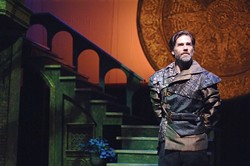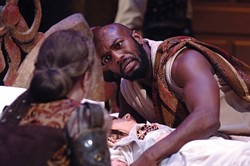A love crime you can get behind
Is Othello a play about a handkerchief--or something more?
By Ashley Schwellenbach[{
"name": "Newsletter Promo",
"id": "NewsletterPromo",
"class": "inlineCenter",
"insertPoint": "4",
"component": "15264767",
"requiredCountToDisplay": "0"
},{
"name": "Ad - Medium Rectangle CC01 - 300x250",
"id": "AdMediumRectangleCC01300x250",
"class": "inlineCenter",
"insertPoint": "8",
"component": "2963441",
"requiredCountToDisplay": "12"
},{
"name": "Ad - Medium Rectangle LC01 - 300x250",
"id": "AdMediumRectangleCC01300x250",
"class": "inlineCenter",
"insertPoint": "18",
"component": "2963441",
"requiredCountToDisplay": "22"
},{
"name": "Ad - Medium Rectangle LC09 - 300x250",
"id": "AdMediumRectangleLC09300x250",
"class": "inlineCenter",
"insertPoint": "28",
"component": "3252660",
"requiredCountToDisplay": "32"
}]
Theater critics have referred to Shakespeare's Othello whimsically--and perhaps aptly--as a play about a handkerchief. It also happens to be a play about love, jealousy, storytelling, and the incapacitating self-doubt of being an "other."
# But speaking as someone who had only experienced this tale in the pages of a book, PCPA production of Othello was striking, in that watching the tragedy unfold on stage is nothing like reading it. The live dialogue completely altered my perception of the characters and their decisions.
I must confess that the true impetus behind my desire to experience Othello as he was meant to breathe and suffer--on stage--is my love for the film, Stage Beauty. The core of this movie is Desdemona's death scene: Does she struggle or does she die beautifully and obediently at the hands of her lord? So, I attended PCPA's production in anticipation of that single scene. What I found instead was an unexpected wealth of comedy and even an improbable mouthpiece for feminism.
That Iago is the play's villain is unquestionable, but in Andrew Philpot's worthy hands, the character becomes a comedian, a master manipulator whose physical presence on stage ebbs and magnifies in response to his fellow characters. Alone, or in the presence of his stooge, Roderigo (played by Michael Jenkinson), Iago is flamboyant, full of schemes, thrusting both his hips and dagger. But to just about anyone else--Othello, Desdemona, Cassio--he is sober, honest Iago. This second, false version of himself is wily enough to drive a seemingly unlikely plot, to drive a recently married and very much in love man to murder his wife at the slightest hint that she could be unfaithful. But this angelic cloak that Iago so easily assumes can't match his private, yet very publicly stated, machinations. He grins, grows quiet, announces "you are a Senator" in a weak insult to Barbantio who is, in fact, a senator. And clasps his head when he realizes that he has just announced what everyone already knows and few would regard as an insult.
The challenge of electing to perform one of Shakespeare's plays, and of being an audience member of one, is that it's highly unlikely that anyone is going to be surprised by the plot. Even the most philistine of theatergoers is aware that the body count escalates quickly in a Shakespearean tragedy, even if such audience members aren't already aware of the specific manner in which each character is dispatched. Toss in the fact that most actors, when faced with a role--any role--in anything written by Shakespeare adopt an altered, self-important accent and gesture grandly and it's a wonder that any of his plays survive today. Audiences shouldn't be expected to fill theaters because they're told Shakespeare is important rather, they should feel how he is important, how his tragedies are their own. Some of those lesser phantom accents found their way into PCPA's performance, but by and large it was a show brimming with moments the modern man and woman can appreciate.
When Cassio cried out, "Oh God, that men should put an enemy in their mouths to steal away their brains," the audience snickered, clearly familiar with the liquid enemy that vanquishes Cassio. And Emilia's plea on behalf of her sex, passionately delivered by Elizabeth Stuart, echoes Shylock's popular "has not a Jew eyes" speech. It is Emilia, who seems to be a somewhat insignificant character in the text of Othello, who defends Desdemona's innocence and chastity and who reveals her husband Iago's role in Othello's downfall, though she knows that she will likely be murdered for her bravery.
# In contrast with Desdemona, praised for her meek and obedient nature, it is Emilia who emerges as the true victim. Desdemona's insistence, first that nobody killed her, then "I myself" rings true. She is a mere doll, a pretty doll, but boring and foolish. In this respect, it may be that not every aspect of Shakespeare's message will reverberate with today's audiences. Desdemona was his tragic heroine: pale, beautiful, and utterly pliant. But Emilia is the character who refuses to accept the sexist trappings of her society. While Desdemona preaches chastity at all costs, Emilia acknowledges that wives have the same appetites as their husbands, and the same rights to fulfill those appetites. In a stunning departure from women's traditional standings as either whores or virgins--a dichotomy frequently employed by Shakespeare and other writers of his time--Emilia establishes a humane middle ground for women.
Ultimately for me, PCPA's production--somewhere between bring a play about a handkerchief, or jealousy, or the social other--became a play about a brilliantly comic villain and his wife, who couldn't save her friend's life but managed to salvage her reputation and honor. And, in this play, reputation is all things. Cassio refers to his name as "the immortal part of myself," and Iago says that a good name is "the immediate jewel" of people's souls. Othello's last words instruct the crowd of onlookers as to how they should regard him after he is dead. It may be, in fact, that Othello is a play about reputation. But you'll just have to decide for yourself.
INFOBOX: The green-eyed monster
PCPA will present Othello through March 2. Shows take place Thursdays, Fridays, and Saturdays at 7 p.m. and Wednesdays, Saturdays, and Sundays at 2 p.m. Tickets cost between $10.25 and $17.50 for children and students and $16.25 and $25.75 for adults. Theater patrons with subscriptions to the winter or spring season can save up to 45 percent on individual tickets. For more information, or to purchase tickets, visit www.pcpa.org or call 922-8313.
Arts Editor Ashley Schwellenbach requests that the woman who sat in front of her and snored throughout the entire performance refrain from attending the theater in the future. Send tales of rude audience members to [email protected].












